Introduction
This page was updated March 27, 2025.
In 1889, two literary giants crossed paths in an encounter that would later be immortalized in print. A young Rudyard Kipling, just 23 years old and at the beginning of his writing career, traveled from India to America with one particular mission in mind: to meet the already-famous Mark Twain, then 45 and at the height of his literary powers.
What followed was a remarkable meeting of minds, captured in Kipling’s vivid prose with all the enthusiasm of a devoted admirer finally meeting his literary hero. The account takes us on Kipling’s determined journey to find Twain—from Buffalo to Elmira, through misdirections and near-misses, until he finally arrives at the doorstep of the great American humorist.
The conversation that unfolds between these two masters of the written word ranges from copyright law to the nature of conscience, from the creative process to the impossibility of true autobiography. Throughout the piece, Kipling’s reverence for Twain shines through, alongside his keen observations of the man behind the books—the slow drawl, the twinkling eyes beneath heavy brows, and the ever-present pipe.
This delightful literary artifact not only gives us insight into Mark Twain as seen through the eyes of another brilliant writer, but also provides a glimpse of the young Kipling himself—observant, appreciative, and already possessing the narrative gifts that would eventually earn him his own place in the literary pantheon.
What’s in the Interview
The interview captures a wide-ranging conversation between these two literary figures. Readers will find Twain’s passionate views on copyright law, including his colorful analogies comparing literary works to real estate. He shares amusing anecdotes about publishers who “improved” his essays and turned them into books on subjects like dentistry and theology. The conversation moves to Twain’s creative process, particularly regarding Tom Sawyer’s fate, with Twain revealing he considered two potential sequels—one where Tom rises to Congress, another where he meets the gallows.
Twain also offers fascinating insights on autobiography, declaring it impossible for anyone to tell the complete truth about themselves in writing. There’s a memorable discourse on conscience, which Twain suggests should be “spanked” when rebellious, like a child. Throughout, Kipling vividly describes Twain’s mannerisms—his light step, his cob pipe, and his distinctive drawl—giving readers an intimate portrait of the American literary icon in his element.
My Interview With Mark Twain by Rudyard Kipling
From time to time we post historic articles. This famous interview has been on our site for a long while, but I thought I would bring it back to the front page for your enjoyment. It’s rather long, but worth the read. This meeting took place in 1889. Kipling was just starting his writing career at age 23. Twain would have been about 45 years old.
You are a contemptible lot, over yonder. Some of you are Commissioners, and some Lieutenant-Governors, and some have the V. C., and a few are privileged to walk about the Mall arm in arm with the Viceroy; but I have seen Mark Twain this golden morning, have shaken his hand, and smoked a cigar—no, two cigars—with him, and talked with him for more than two hours! Understand clearly that I do not despise you; indeed, I don’t. I am only very sorry for you, from the Viceroy downward. To soothe your envy and to prove that I still regard you as my equals, I will tell you all about it.
They said in Buffalo that he was in Hartford, Conn.; and again they said “perchance he is gone upon a journey to Portland”; and a big, fat drummer vowed that he knew the great man intimately, and that Mark was spending the summer in Europe—which information so upset me that I embarked upon the wrong train, and was incontinently turned out by the conductor three-quarters of a mile from the station, amid the wilderness of railway tracks. Have you ever, encumbered with great-coat and valise, tried to dodge diversely-minded locomotives when the sun was shining in your eyes? But I forgot that you have not seen Mark Twain, you people of no account!
Saved from the jaws of the cow-catcher, me wandering devious a stranger met.
“Elmira is the place. Elmira in the State of New York—this State, not two hundred miles away;” and he added, perfectly unnecessarily, “Slide, Kelley, slide.”
I slid on the West Shore line, I slid till midnight, and they dumped me down at the door of a frowzy hotel in Elmira. Yes, they knew all about “that man Clemens,” but reckoned he was not in town; had gone East somewhere. I had better possess my soul in patience till the morrow, and then dig up the “man Clemens'” brother-in-law, who was interested in coal.
The idea of chasing half a dozen relatives in addition to Mark Twain up and down a city of thirty thousand inhabitants kept me awake. Morning revealed Elmira, whose streets were desolated by railway tracks, and whose suburbs were given up to the manufacture of door-sashes and window-frames. It was surrounded by pleasant, fat, little hills, rimmed with timber and topped with cultivation. The Chemung River flowed generally up and down the town, and had just finished flooding a few of the main streets.
The hotel-man and the telephone-man assured me that the much-desired brother-in-law was out of town, and no one seemed to know where “the man Clemens” abode. Later on I discovered that he had not summered in that place for more than nineteen seasons, and so was comparatively a new arrival.
A friendly policeman volunteered the news that he had seen Twain or “some one very like him” driving a buggy the day before. This gave me a delightful sense of nearness. Fancy living in a town where you could see the author of Tom Sawyer, or “some one very like him,” jolting over the pavements in a buggy!
“He lives out yonder at East Hill,” said the policeman; “three miles from here.”
Then the chase began—in a hired hack, up an awful hill, where sunflowers blossomed by the roadside, and crops waved, and Harper’s Magazine cows stood in eligible and commanding attitudes knee-deep in clover, all ready to be transferred to photogravure. The great man must have been persecuted by outsiders aforetime, and fled up the hill for refuge.
Presently the driver stopped at a miserable, little, white wood shanty, and demanded “Mister Clemens.”
“I know he’s a big-bug and all that,” he explained, “but you can never tell what sort of notions those sort of men take into their heads to live in, anyways.”
There rose up a young lady who was sketching thistle-tops and goldenrod, amid a plentiful supply of both, and set the pilgrimage on the right path.
“It’s a pretty Gothic house on the left-hand side a little way farther on.”
“Gothich——,” said the driver. “Very few of the city hacks take this drive, specially if they know they are coming out here,” and he glared at me savagely.
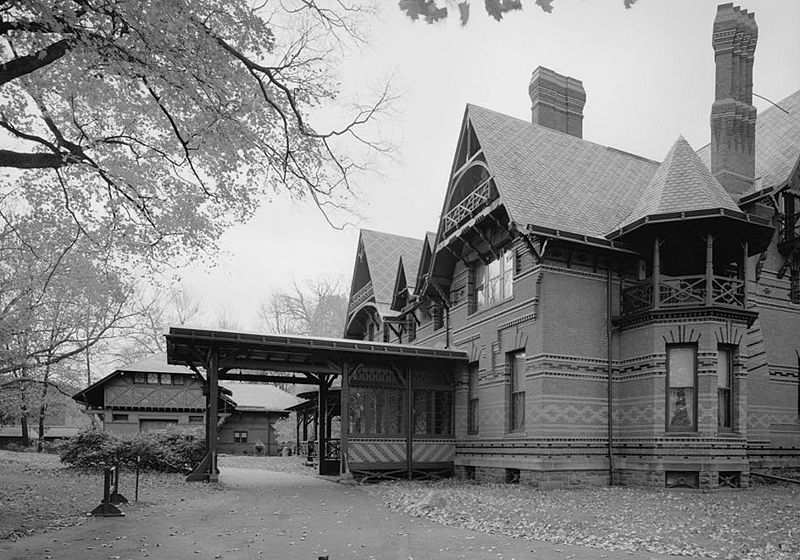 It was a very pretty house, anything but Gothic, clothed with ivy, standing in a very big compound, and fronted by a verandah full of chairs and hammocks. The roof of the verandah was a trellis-work of creepers, and the sun peeping through moved on the shining boards below.
It was a very pretty house, anything but Gothic, clothed with ivy, standing in a very big compound, and fronted by a verandah full of chairs and hammocks. The roof of the verandah was a trellis-work of creepers, and the sun peeping through moved on the shining boards below.
Decidedly this remote place was an ideal one for work, if a man could work among these soft airs and the murmur of the long-eared crops.
Appeared suddenly a lady used to dealing with rampageous outsiders. “Mr. Clemens has just walked down-town. He is at his brother-in-law’s house.”
Then he was within shouting distance, after all, and the chase had not been in vain. With speed I fled, and the driver, skidding the wheel and swearing audibly, arrived at the bottom of that hill without accidents. It was in the pause that followed between ringing the brother-in-law’s bell and getting an answer that it occurred to me for the first time Mark Twain might possibly have other engagements than the entertainment of escaped lunatics from India, be they never so full of admiration. And in another man’s house—anyhow, what had I come to do or say? Suppose the drawing-room should be full of people,—suppose a baby were sick, how was I to explain that I only wanted to shake hands with him?
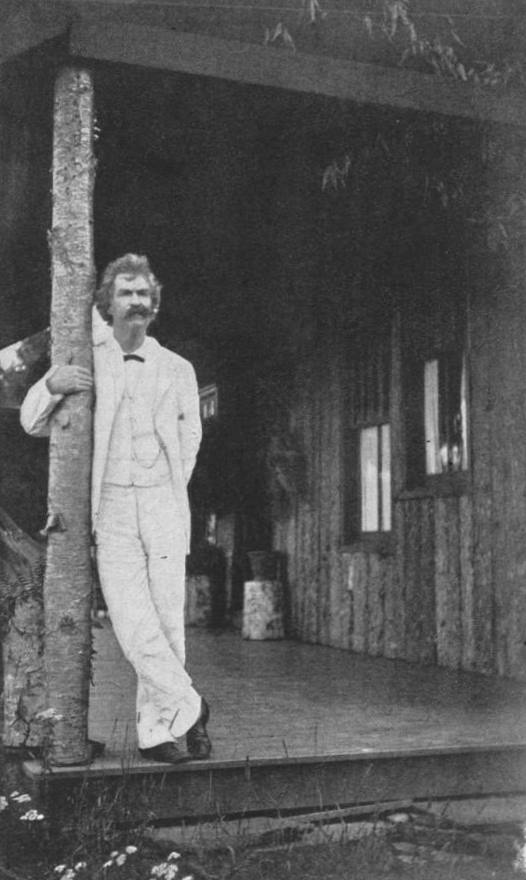 Then things happened somewhat in this order. A big, darkened drawing-room; a huge chair; a man with eyes, a mane of grizzled hair, a brown mustache covering a mouth as delicate as a woman’s, a strong, square hand shaking mine, and the slowest, calmest, levellest voice in all the world saying:—
Then things happened somewhat in this order. A big, darkened drawing-room; a huge chair; a man with eyes, a mane of grizzled hair, a brown mustache covering a mouth as delicate as a woman’s, a strong, square hand shaking mine, and the slowest, calmest, levellest voice in all the world saying:—
“Well, you think you owe me something, and you’ve come to tell me so. That’s what I call squaring a debt handsomely.”
“Piff!” from a cob-pipe (I always said that a Missouri meerschaum was the best smoking in the world), and, behold! Mark Twain had curled himself up in the big armchair, and I was smoking reverently, as befits one in the presence of his superior.
The thing that struck me first was that he was an elderly man; yet, after a minute’s thought, I perceived that it was otherwise, and in five minutes, the eyes looking at me, I saw that the grey hair was an accident of the most trivial. He was quite young. I was shaking his hand. I was smoking his cigar, and I was hearing him talk—this man I had learned to love and admire fourteen thousand miles away.
Reading his books, I had striven to get an idea of his personality, and all my preconceived notions were wrong and beneath the reality. Blessed is the man who finds no disillusion when he is brought face to face with a revered writer. That was a moment to be remembered; the landing of a twelve-pound salmon was nothing to it. I had hooked Mark Twain, and he was treating me as though under certain circumstances I might be an equal.
About this time I became aware that he was discussing the copyright question. Here, so far as I remember, is what he said. Attend to the words of the oracle through this unworthy medium transmitted. You will never be able to imagine the long, slow surge of the drawl, and the deadly gravity of the countenance, the quaint pucker of the body, one foot thrown over the arm of the chair, the yellow pipe clinched in one corner of the mouth, and the right hand casually caressing the square chin:—
“Copyright? Some men have morals, and some men have—other things. I presume a publisher is a man. He is not born. He is created—by circumstances. Some publishers have morals. Mine have. They pay me for the English productions of my books. When you hear men talking of Bret Harte’s works and other works and my books being pirated, ask them to be sure of their facts. I think they’ll find the books are paid for. It was ever thus.
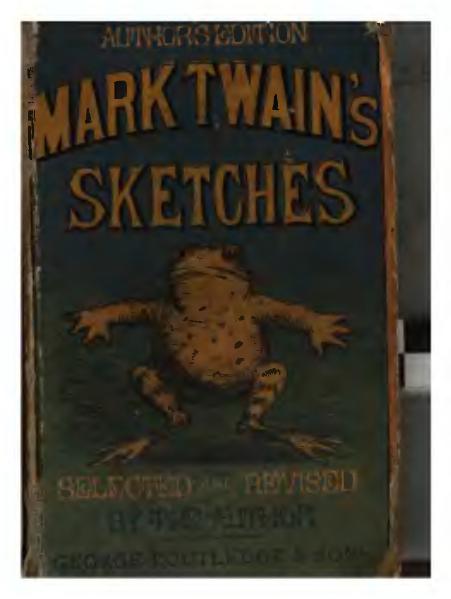 “I remember an unprincipled and formidable publisher. Perhaps he’s dead now. He used to take my short stories—I can’t call it steal or pirate them. It was beyond these things altogether. He took my stories one at a time and made a book of it. If I wrote an essay on dentistry or theology or any little thing of that kind—just an essay that long (he indicated half an inch on his finger), any sort of essay—that publisher would amend and improve my essay.
“I remember an unprincipled and formidable publisher. Perhaps he’s dead now. He used to take my short stories—I can’t call it steal or pirate them. It was beyond these things altogether. He took my stories one at a time and made a book of it. If I wrote an essay on dentistry or theology or any little thing of that kind—just an essay that long (he indicated half an inch on his finger), any sort of essay—that publisher would amend and improve my essay.
“He would get another man to write some more to it or cut it about exactly as his needs required. Then he would publish a book called Dentistry by Mark Twain, that little essay and some other things not mine added. Theology would make another book, and so on. I do not consider that fair. It’s an insult. But he’s dead now, I think. I didn’t kill him.
“There is a great deal of nonsense talked about international copyright. The proper way to treat a copyright is to make it exactly like real-estate in every way.
“It will settle itself under these conditions. If Congress were to bring in a law that a man’s life was not to extend over a hundred and sixty years, somebody would laugh. That law wouldn’t concern anybody. The man would be out of the jurisdiction of the court. A term of years in copyright comes to exactly the same thing. No law can make a book live or cause it to die before the appointed time.
“Tottletown, Cal., was a new town, with a population of three thousand—banks, fire-brigade, brick buildings, and all the modern improvements. It lived, it flourished, and it disappeared. To-day no man can put his foot on any remnant of Tottletown, Cal. It’s dead. London continues to exist. Bill Smith, author of a book read for the next year or so, is real-estate in Tottletown. William Shakespeare, whose works are extensively read, is real-estate in London. Let Bill Smith, equally with Mr. Shakespeare now deceased, have as complete a control over his copyright as he would over his real-estate. Let him gamble it away, drink it away, or—give it to the church. Let his heirs and assigns treat it in the same manner.
“Every now and again I go up to Washington, sitting on a board to drive that sort of view into Congress. Congress takes its arguments against international copyright delivered ready made, and—Congress isn’t very strong. I put the real-estate view of the case before one of the Senators.
“He said: ‘Suppose a man has written a book that will live for ever?’
“I said: ‘Neither you nor I will ever live to see that man, but we’ll assume it. What then?’
“He said: ‘I want to protect the world against that man’s heirs and assigns, working under your theory.’
“I said: ‘You think that all the world has no commercial sense. The book that will live for ever can’t be artificially kept up at inflated prices. There will always be very expensive editions of it and cheap ones issuing side by side.’
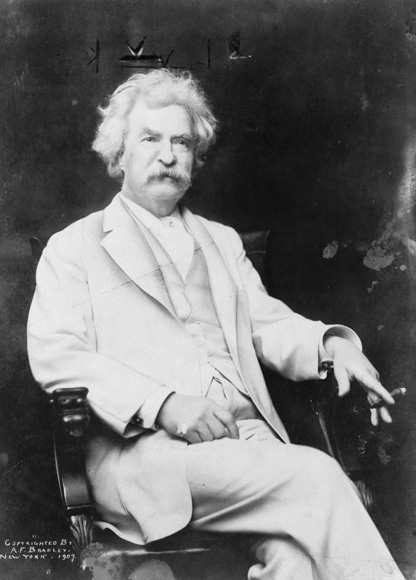 “Take the case of Sir Walter Scott’s novels,” Mark Twain continued, turning to me. “When the copyright notes protected them, I bought editions as expensive as I could afford, because I liked them. At the same time the same firm were selling editions that a cat might buy. They had their real estate, and not being fools, recognised that one portion of the plot could be worked as a gold mine, another as a vegetable garden, and another as a marble quarry. Do you see?”
“Take the case of Sir Walter Scott’s novels,” Mark Twain continued, turning to me. “When the copyright notes protected them, I bought editions as expensive as I could afford, because I liked them. At the same time the same firm were selling editions that a cat might buy. They had their real estate, and not being fools, recognised that one portion of the plot could be worked as a gold mine, another as a vegetable garden, and another as a marble quarry. Do you see?”
What I saw with the greatest clearness was Mark Twain being forced to fight for the simple proposition that a man has as much right to the work of his brains (think of the heresy of it!) as to the labour of his hands. When the old lion roars, the young whelps growl. I growled assentingly, and the talk ran on from books in general to his own in particular.
Growing bold, and feeling that I had a few hundred thousand folk at my back, I demanded whether Tom Sawyer married Judge Thatcher’s daughter and whether we were ever going to hear of Tom Sawyer as a man.
“I haven’t decided,” quoth Mark Twain, getting up, filling his pipe, and walking up and down the room in his slippers. “I have a notion of writing the sequel to Tom Sawyer in two ways. In one I would make him rise to great honour and go to Congress, and in the other I should hang him. Then the friends and enemies of the book could take their choice.”
Here I lost my reverence completely, and protested against any theory of the sort, because, to me at least, Tom Sawyer was real.
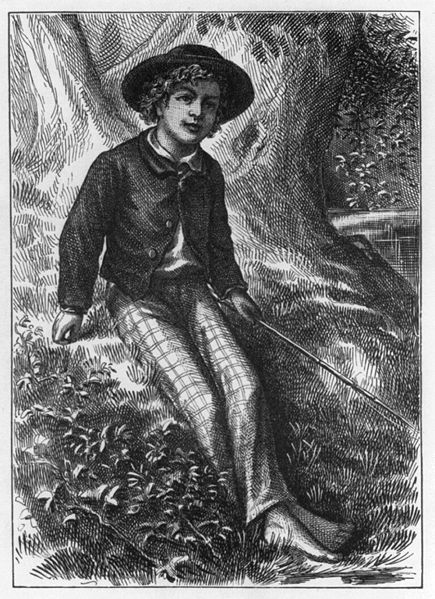 “Oh, he is real,” said Mark Twain. “He’s all the boy that I have known or recollect; but that would be a good way of ending the book”; then, turning round, “because, when you come to think of it, neither religion, training, nor education avails anything against the force of circumstances that drive a man. Suppose we took the next four and twenty years of Tom Sawyer’s life, and gave a little joggle to the circumstances that controlled him. He would, logically and according to the joggle, turn out a rip or an angel.”
“Oh, he is real,” said Mark Twain. “He’s all the boy that I have known or recollect; but that would be a good way of ending the book”; then, turning round, “because, when you come to think of it, neither religion, training, nor education avails anything against the force of circumstances that drive a man. Suppose we took the next four and twenty years of Tom Sawyer’s life, and gave a little joggle to the circumstances that controlled him. He would, logically and according to the joggle, turn out a rip or an angel.”
“Do you believe that, then?”
“I think so. Isn’t it what you call Kismet?”
“Yes; but don’t give him two joggles and show the result, because he isn’t your property any more. He belongs to us.”
He laughed—a large, wholesome laugh—and this began a dissertation on the rights of a man to do what he liked with his own creations, which being a matter of purely professional interest, I will mercifully omit.
Returning to the big chair, he, speaking of truth and the like in literature, said that an autobiography was the one work in which a man, against his own will and in spite of his utmost striving to the contrary, revealed himself in his true light to the world.
“A good deal of your life on the Mississippi is autobiographical, isn’t it?” I asked.
“As near as it can be—when a man is writing to a book and about himself. But in genuine autobiography, I believe it is impossible for a man to tell the truth about himself or to avoid impressing the reader with the truth about himself.
“I made an experiment once. I got a friend of mine—a man painfully given to speak the truth on all occasions—a man who wouldn’t dream of telling a lie—and I made him write his autobiography for his own amusement and mine. He did it. The manuscript would have made an octavo volume, but—good, honest man that he was—in every single detail of his life that I knew about he turned out, on paper, a formidable liar. He could not help himself.
“It is not in human nature to write the truth about itself. None the less the reader gets a general impression from an autobiography whether the man is a fraud or a good man. The reader can’t give his reasons any more than a man can explain why a woman struck him as being lovely when he doesn’t remember her hair, eyes, teeth, or figure. And the impression that the reader gets is a correct one.”
“Do you ever intend to write an autobiography?”
“If I do, it will be as other men have done—with the most earnest desire to make myself out to be the better man in every little business that has been to my discredit; and I shall fail, like the others, to make my readers believe anything except the truth.”
This naturally led to a discussion on conscience. Then said Mark Twain, and his words are mighty and to be remembered:—
“Your conscience is a nuisance. A conscience is like a child. If you pet it and play with it and let it have everything that it wants, it becomes spoiled and intrudes on all your amusements and most of your griefs. Treat your conscience as you would treat anything else. When it is rebellious, spank it—be severe with it, argue with it, prevent it from coming to play with you at all hours, and you will secure a good conscience; that is to say, a properly trained one. A spoiled one simply destroys all the pleasure in life. I think I have reduced mine to order. At least, I haven’t heard from it for some time. Perhaps I have killed it from over-severity. It’s wrong to kill a child, but, in spite of all I have said, a conscience differs from a child in many ways. Perhaps it’s best when it’s dead.”
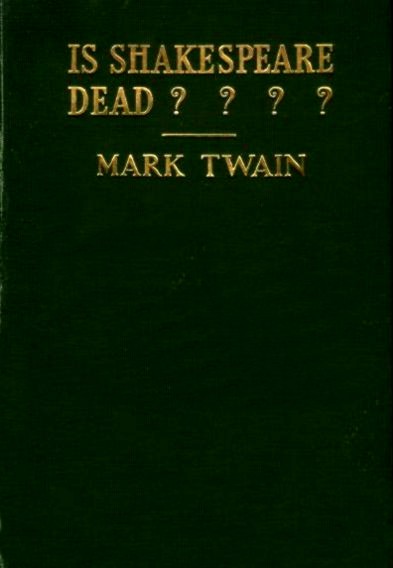 Here he told me a little—such things as a man may tell a stranger—of his early life and upbringing, and in what manner he had been influenced for good by the example of his parents. He spoke always through his eyes, a light under the heavy eyebrows; anon crossing the room with a step as light as a girl’s, to show me some book or other; then resuming his walk up and down the room, puffing at the cob pipe. I would have given much for nerve enough to demand the gift of that pipe—value, five cents when new. I understood why certain savage tribes ardently desired the liver of brave men slain in combat. That pipe would have given me, perhaps, a hint of his keen insight into the souls of men. But he never laid it aside within stealing reach.
Here he told me a little—such things as a man may tell a stranger—of his early life and upbringing, and in what manner he had been influenced for good by the example of his parents. He spoke always through his eyes, a light under the heavy eyebrows; anon crossing the room with a step as light as a girl’s, to show me some book or other; then resuming his walk up and down the room, puffing at the cob pipe. I would have given much for nerve enough to demand the gift of that pipe—value, five cents when new. I understood why certain savage tribes ardently desired the liver of brave men slain in combat. That pipe would have given me, perhaps, a hint of his keen insight into the souls of men. But he never laid it aside within stealing reach.
Once, indeed, he put his hand on my shoulder. It was an investiture of the Star of India, blue silk, trumpets, and diamond-studded jewel, all complete. If hereafter, in the changes and chances of this mortal life, I fall to cureless ruin, I will tell the superintendent of the workhouse that Mark Twain once put his hand on my shoulder; and he shall give me a room to myself and a double allowance of paupers’ tobacco.
“I never read novels myself,” said he, “except when the popular persecution forces me to—when people plague me to know what I think of the last book that every one is reading.”
“And how did the latest persecution affect you?”
“Robert?” said he, interrogatively.
I nodded.
“I read it, of course, for the workmanship. That made me think I had neglected novels too long—that there might be a good many books as graceful in style somewhere on the shelves; so I began a course of novel reading. I have dropped it now; it did not amuse me. But as regards Robert, the effect on me was exactly as though a singer of street ballads were to hear excellent music from a church organ. I didn’t stop to ask whether the music was legitimate or necessary. I listened, and I liked what I heard. I am speaking of the grace and beauty of the style.”
“You see,” he went on, “every man has his private opinion about a book. But that is my private opinion. If I had lived in the beginning of things, I should have looked around the township to see what popular opinion thought of the murder of Abel before I openly condemned Cain. I should have had my private opinion, of course, but I shouldn’t have expressed it until I had felt the way. You have my private opinion about that book. I don’t know what my public ones are exactly. They won’t upset the earth.”
He recurled himself into the chair and talked of other things.
“I spend nine months of the year at Hartford. I have long ago satisfied myself that there is no hope of doing much work during those nine months. People come in and call. They call at all hours, about everything in the world. One day I thought I would keep a list of interruptions. It began this way:—
“A man came and would see no one but Mr. Clemens. He was an agent for photogravure reproductions of Salon pictures. I very seldom use Salon pictures in my books.
“After that man another man, who refused to see any one but Mr. Clemens, came to make me write to Washington about something. I saw him. I saw a third man, then a fourth. By this time it was noon. I had grown tired of keeping the list. I wished to rest.
“But the fifth man was the only one of the crowd with a card of his own. He sent up his card. ‘Ben Koontz, Hannibal, Mo.’ I was raised in Hannibal. Ben was an old schoolmate of mine. Consequently I threw the house wide open and rushed with both hands out at a big, fat, heavy man, who was not the Ben I had ever known—nor anything like him.
“‘But is it you, Ben?’ I said. ‘You’ve altered in the last thousand years.’
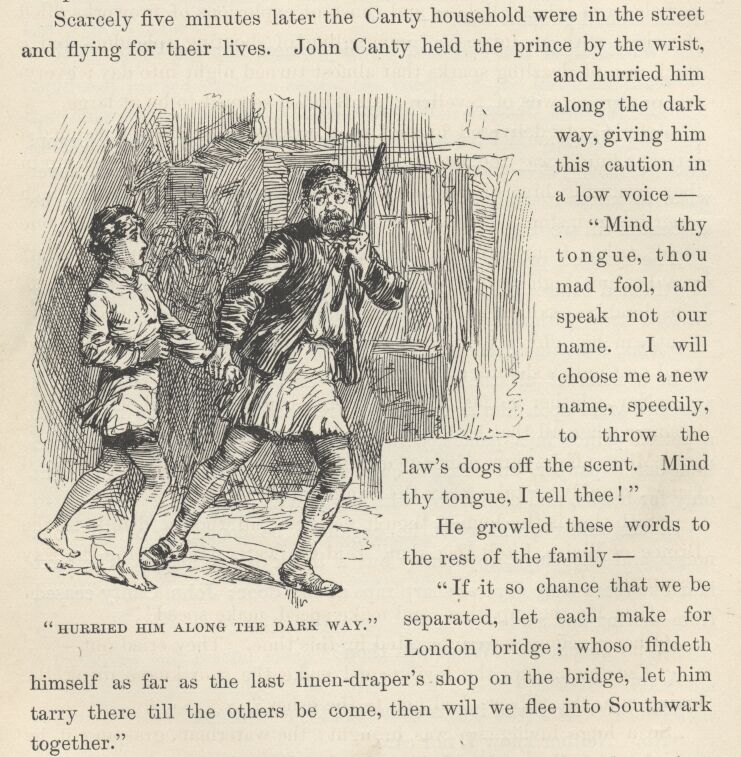 “The fat man said: ‘Well, I’m not Koontz exactly, but I met him down in Missouri, and he told me to be sure and call on you, and he gave me his card, and’—here he acted the little scene for my benefit—’if you can wait a minute till I can get out the circulars—I’m not Koontz exactly, but I’m travelling with the fullest line of rods you ever saw.'”
“The fat man said: ‘Well, I’m not Koontz exactly, but I met him down in Missouri, and he told me to be sure and call on you, and he gave me his card, and’—here he acted the little scene for my benefit—’if you can wait a minute till I can get out the circulars—I’m not Koontz exactly, but I’m travelling with the fullest line of rods you ever saw.'”
“And what happened?” I asked breathlessly.
“I shut-the door. He was not Ben Koontz—exactly—not my old school-fellow, but I had shaken him by both hands in love, and … I had been bearded by a lightning-rod man in my own house.
“As I was saying, I do very little work in Hartford. I come here for three months every year, and I work four or five hours a day in a study down the garden of that little house on the hill. Of course, I do not object to two or three interruptions. When a man is in the full swing of his work these little things do not affect him. Eight or ten or twenty interruptions retard composition.”
I was burning to ask him all manner of impertinent questions, as to which of his works he himself preferred, and so forth; but, standing in awe of his eyes, I dared not. He spoke on, and I listened, grovelling.
It was a question of mental equipment that was on the carpet, and I am still wondering whether he meant what he said.
“Personally I never care for fiction or story-books. What I like to read about are facts and statistics of any kind. If they are only facts about the raising of radishes, they interest me. Just now, for instance, before you came in”—he pointed to an encyclopædia on the shelves—”I was reading an article about ‘Mathematics.’ Perfectly pure mathematics.
“My own knowledge of mathematics stops at ‘twelve times twelve,’ but I enjoyed that article immensely. I didn’t understand a word of it: but facts, or what a man believes to be facts, are always delightful. That mathematical fellow believed in his facts. So do I. Get your facts first, and”—the voice dies away to an almost inaudible drone—”then you can distort ’em as much as you please.”
Bearing this precious advice in my bosom, I left; the great man assuring me with gentle kindness that I had not interrupted him in the least. Once outside the door, I yearned to go back and ask some questions—it was easy enough to think of them now—but his time was his own, though his books belonged to me.
I should have ample time to look back to that meeting across the graves of the days. But it was sad to think of the things he had not spoken about.
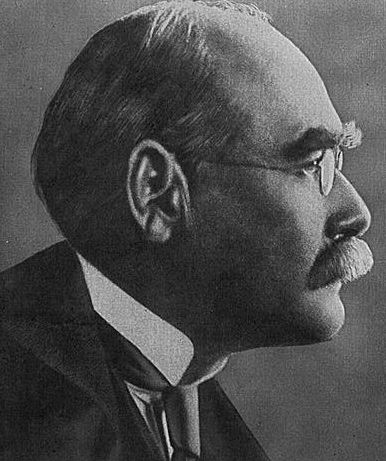 In San Francisco the men of The Call told me many legends of Mark’s apprenticeship in their paper five and twenty years ago; how he was a reporter delightfully incapable of reporting according to the needs of the day. He preferred, so they said, to coil himself into a heap and meditate until the last minute. Then he would produce copy bearing no sort of relationship to his legitimate work—copy that made the editor swear horribly, and the readers of The Call ask for more.
In San Francisco the men of The Call told me many legends of Mark’s apprenticeship in their paper five and twenty years ago; how he was a reporter delightfully incapable of reporting according to the needs of the day. He preferred, so they said, to coil himself into a heap and meditate until the last minute. Then he would produce copy bearing no sort of relationship to his legitimate work—copy that made the editor swear horribly, and the readers of The Call ask for more.
I should like to have heard Mark’s version of that, with some stories of his joyous and variegated past. He has been journeyman printer (in those days he wandered from the banks of the Missouri even to Philadelphia), pilot cub and full-blown pilot, soldier of the South (that was for three weeks only), private secretary to a Lieutenant-Governor of Nevada (that displeased him), miner, editor, special correspondent in the Sandwich Islands, and the Lord only knows what else. If so experienced a man could by any means be made drunk, it would be a glorious thing to fill him up with composite liquors, and, in the language of his own country, “let him retrospect.” But these eyes will never see that orgy fit for the gods!
Why This Interview Matters
This historic encounter between Kipling and Twain transcends mere literary curiosity to become an important cultural document. First published in 1889, it captures a pivotal moment when American literature, embodied by Twain, was gaining global recognition and respect. Through Kipling’s observant eyes, we witness Twain as both the celebrated author and the contemplative thinker wrestling with issues that remain relevant today—intellectual property rights, artistic integrity, and the nature of truth in writing.
The interview also serves as a fascinating snapshot of two writers at different stages of their careers. Twain, established and confident in his craft, generously shares his wisdom with Kipling, who would later emerge as one of the most influential voices in English literature. Their discussion of creative processes and literary ethics provides valuable insights for writers and readers alike.
Perhaps most significantly, this account humanizes a literary giant. Beneath Twain’s public persona, Kipling reveals a thoughtful man grappling with the challenges of his profession—interruptions to his work, public demands on his time, and the struggle to maintain creative authenticity. These glimpses make Twain’s achievements all the more remarkable and remind us that behind great works stand complex individuals navigating the same human dilemmas we all face.
For literary historians, Twain scholars, and casual readers, this interview remains an invaluable window into the mind of one of America’s most beloved authors, preserved through the skillful pen of another master storyteller.
Analysis of “My Interview With Mark Twain” by Rudyard Kipling
Literary Significance and Contextual Framing
Kipling’s interview with Mark Twain represents a remarkable literary crossroads—the meeting of an established American literary icon with a young colonial writer who would later become one of the leading voices of the British Empire. The 1889 encounter captures Twain at the height of his powers and Kipling at the threshold of his career, creating a document that illuminates both figures in revealing ways.
Narrative Structure and Style
Kipling structures his account as a pilgrimage narrative, emphasizing the journey and quest to find Twain. This framing device heightens the significance of the eventual meeting and positions Twain as a literary deity worth pursuing across unfamiliar American terrain. The breathless, excited tone reflects Kipling’s genuine admiration while also serving his stylistic purposes—creating suspense and emphasizing the reward of perseverance.
Kipling’s prose here demonstrates his journalistic foundations. He captures specific details (Twain’s “yellow pipe clinched in one corner of the mouth”), employs vivid scene-setting, and reproduces dialogue with an ear for Twain’s distinctive cadence. Yet he balances reportage with literary flourishes that elevate the piece beyond mere journalism.
Power Dynamics and Colonial Perspective
Throughout the interview, Kipling positions himself as the colonial subject coming before American literary royalty. His opening paragraph directly addresses his Indian audience, contrasting their colonial status with his achievement in meeting Twain. This framework reveals Kipling’s complex relationship with empire and authority—even while deferential to Twain, he establishes his own importance by proximity to greatness.
Thematic Focus
The interview centers around several key themes that mattered deeply to both writers:
- Intellectual Property: Twain’s extended discussion of copyright reveals his passionate belief in authors’ rights to their creative work. His real estate metaphor demonstrates both his business acumen and his gift for making complex issues accessible through concrete comparisons.
- Artistic Authenticity: Twain’s comments on autobiography reveal his understanding of the paradoxical nature of truth in writing—that absolute truth may be impossible, yet genuine character inevitably reveals itself through the act of writing.
- Creative Process: The discussion of Tom Sawyer’s potential futures offers insight into Twain’s approach to character development and narrative planning, while suggesting a somewhat fatalistic view of human destiny.
- Public vs. Private Self: The anecdotes about interruptions highlight the tension between Twain’s public persona and his private creative needs—a tension both writers navigated throughout their careers.
Omissions and Silences
What Kipling doesn’t ask Twain is as significant as what he does. There are no questions about Twain’s views on race, slavery, or American politics—subjects central to works like “Huckleberry Finn.” This absence may reflect the brevity of their meeting, Kipling’s own colonial perspective, or editorial decisions about what would interest his primary readership.
Literary Legacy
This interview stands as an important literary artifact not just for what it reveals about Twain, but for how it demonstrates the international literary networks forming in the late 19th century. It captures two writers whose work would come to define aspects of their respective national literatures, meeting across cultural boundaries through their shared craft.
Kipling’s evident hero-worship humanizes both figures—reminding us that even great writers look up to other writers—while his skilled reportage preserves a vivid portrait of Twain that complements and sometimes complicates the author’s public image and his own writings.
Mark Twain Bio
Mark Twain was the pen name of Samuel Langhorne Clemens (1835-1910), one of the most iconic American writers. Born in Missouri, Twain started working as a typesetter and printer early in life before embarking on travels up and down the Mississippi River as a steamboat pilot apprentice. This river lifestyle inspired many of Twain’s early writings, especially his pen name which refers to measuring depths on the river. His greatest works include The Adventures of Tom Sawyer, The Adventures of Huckleberry Finn, and The Gilded Age. Known for his sharp humor and satire of American life, Twain captured regional dialects and landscape like no other writer. Though many of his works highlighted the social and racial injustices of the time period, he remains one of the most widely taught classic American authors. With over 20 novels and short story collections, Mark Twain left an endearing stamp on literature, culture and education around the world.
Rudyard Kipling Bio
Rudyard Kipling (1865-1936) was a celebrated English author and poet born in Bombay, India. As a child, Kipling was educated in England before returning to India in 1882 to work as a journalist. His early works like Plain Tales from the Hills drew heavily on his firsthand experiences in British India. Kipling went on to publish popular poetry and novels like The Jungle Book that explored colonialism, the British empire, and the realities of native Indian culture under imperial rule. With poems like “If—” and “The White Man’s Burden”, Kipling captured the complex duality of imperial life. After winning the Nobel Prize for Literature in 1907, he continued writing poetry, short stories and novels like Kim that cemented his reputation as a preeminent author who illuminated the exotic. Though Kipling has faced modern criticism for perceived imperialist overtones, his compelling works made him one of the most famous writers in English in the late 19th and early 20th centuries. With memorable characters and his innovative incorporation of vernacular speech, Kipling left a lasting mark on English literature.
- Story Structure: How the Save the Cat! Method Can Transform Your Writing - April 23, 2025
- HALFWAY TO HALLOWEEN: 50 Words of Horror Contest - April 22, 2025
- How to Edit your poetry for beginners and beyond (with worksheet) - April 18, 2025
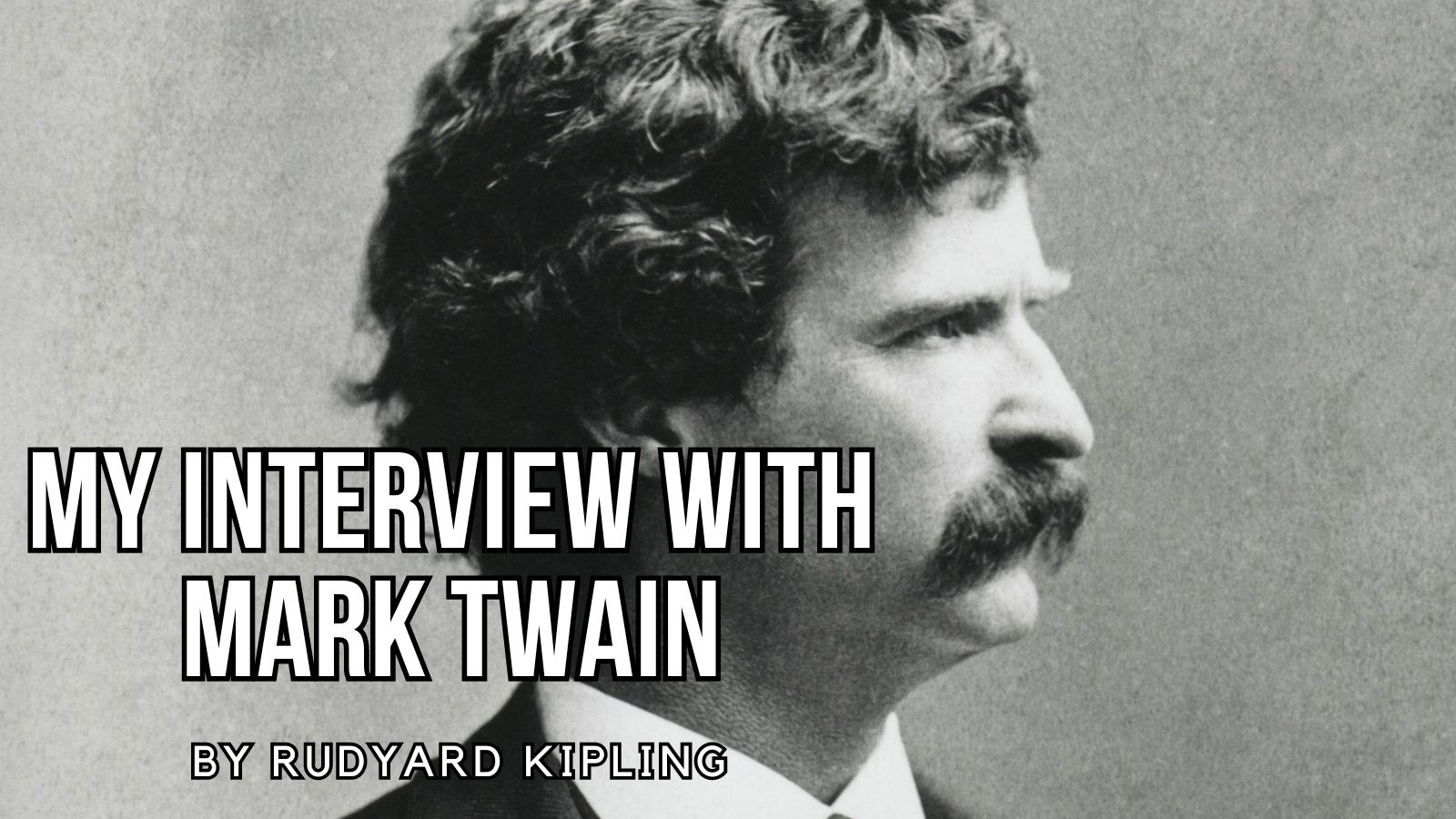
What a fine, sweet article. So glad to see and read.
EW
I found the article very impressive and thought-provoking.